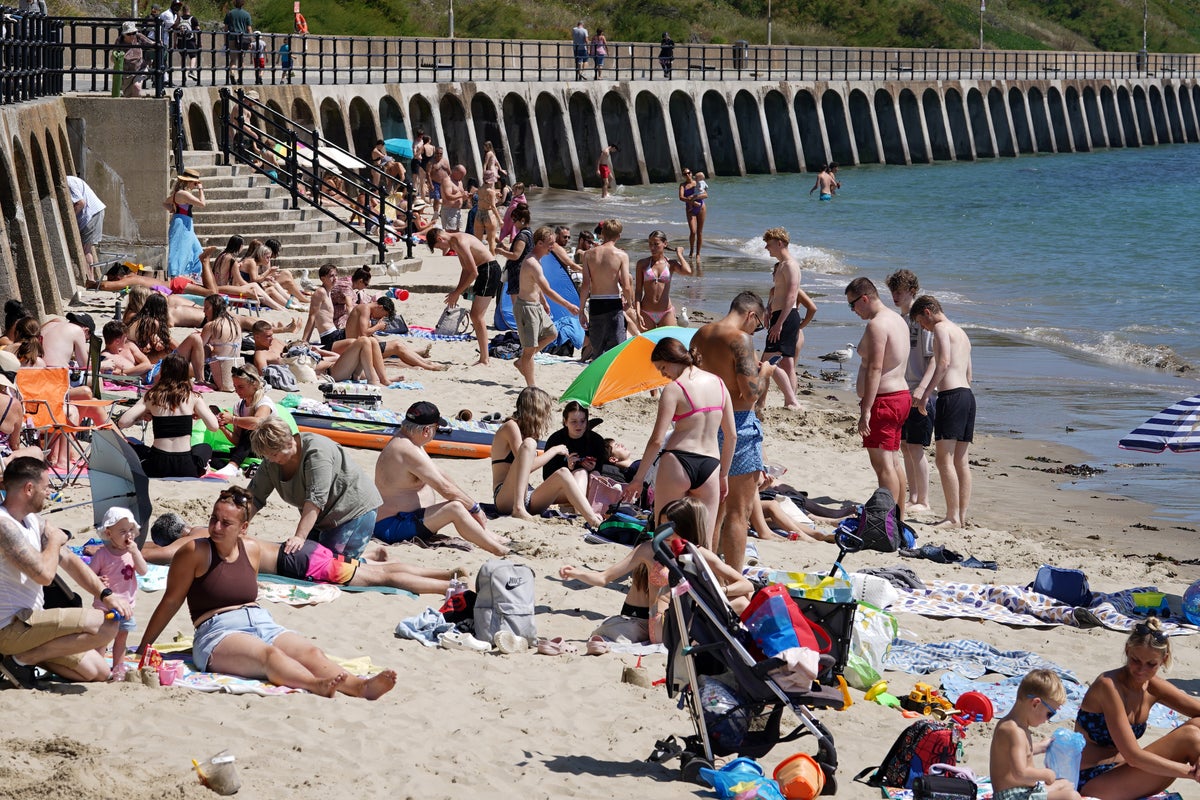Do not contact us about hosepipe ban rulebreakers, police have told the public ahead of what is expected to be the hottest weekend of the year with highs of more than 34C forecast.
Temperatures reached 34.7C at Astwood Bank, near Worcester, on Friday, the Met Office said, with similar or even higher temperatures expected on Saturday.
Scotland recorded its warmest day in more than two years on Saturday as the mercury hit 30C in Aviemore.
Amber heat health alerts are in place for the Midlands and southern and eastern England until 9am on Monday, warning of the potential for a rise in deaths, particularly among those aged 65 and over or with health conditions.
Hosepipe bans have also been introduced across parts of England, with swathes of the country suffering drought conditions and water shortages after the driest spring since 1893.
However, Ch Supt Tracy Bradley, from Humberside Police, has urged people not to reach out to police about those flouting the bans but to contact Yorkshire Water instead.
She explained to the BBC that calls “could divert call handlers away from dealing with emergencies or other policing matters”.
Nearly seven million Britons, more than 10 per cent of England’s population, are facing restrictions on how they can use their water, with those who ignore the bans threatened with fines of up to £1,000.
Yorkshire Water brought in restrictions on using hosepipes for activities such as watering the garden, cleaning cars and filling paddling pools on Friday, as part of efforts to protect supplies in the face of yet more dry weather forecast for the coming weeks.
South East Water said demand for drinking water had reached “record levels since May”, adding: “This situation has left us with no choice but to restrict the use of hosepipes and sprinklers, so we can help our reservoirs and underground water storage recover.”
It means customers in Kent and Sussex are banned from using a hosepipe to water gardens and plants, clean vehicles, fill swimming pools or ponds or clean paths, walls or windows.
On Friday, Wales recorded its hottest day of the year with 32.4C in Cardiff’s Bute Park, and temperatures have widely reached the high 20s across the country. Even the Scottish Highlands had very hot weather, with a high of 28.9C in Aboyne, a village in Aberdeenshire.
“It might be plus or minus half a degree higher or lower [on Saturday], probably maybe a little bit higher, but that’s going to be the peak as then temperatures start coming down a little bit through the second half of the weekend as low pressure slowly starts to edge in,” meteorologist Greg Dewhurst said.
Areas such as Abergavenny and Monmouth in Wales are forecast to reach temperatures of 34C.
The Met Office said that though temperatures may peak on Saturday, it will remain “very warm” across the country on Sunday.
“We’re probably looking at maximum temperatures around 30C, 31C degrees across central and southern England, but still widely across the whole UK, mid to high 20s,” Mr Dewhurst said.
“It could still get to around 29 or 30C across southeast England on Monday, and then everyone into the fresher air by Tuesday, temperatures more like 23C, 24C as the maximum temperature.”
As well as the amber alerts, the UK Health Security Agency (UKHSA) has yellow alerts in place until Monday for the North East, North West and Yorkshire and Humber.
Fire chiefs have urged people to stay safe as they warned of the increased risk of wildfires and drowning during the heatwave.
The National Fire Chiefs Council (NFCC) asked people not to enter water to try to cool down and urged parents and carers to ensure children are supervised around water at all times.
NFCC chairman Phil Garrigan said: “We are urging people to take simple but vital safety precautions to protect themselves and their loved ones during this period of hot, dry weather. Our experience tells us that wildfires can start in an instant and escalate rapidly. That’s why we’re asking everyone to stay alert and act responsibly.”
HM Coastguard also issued safety advice for people heading to the coast, as data from the water incident database shows most drownings occurred in July over the last three years.
The London Fire Brigade said it has responded to 24 wildfires this year, five of which occurred this week, including one in Manor Park, east London, on Friday afternoon, where 70 firefighters fought to tackle a grass fire on Wanstead Flats.
The risk of wildfires in London is currently rated at “severe” by the Natural Hazards Partnership.
National Rail has warned train passengers that the hot weather may cause disruption this weekend.
“Heat can cause overhead lines to expand and sag, rails to buckle, and also line-side fires,” it said on its website.
Meanwhile, the RNLI warned beachgoers that, despite the heat, there is still a risk of cold water shock.
Ross Macleod, the charity’s water safety manager, said: “Even in hot weather, the seas around our coasts are cold enough year-round to trigger cold water shock, while waves and rip currents can overpower even the most experienced water users.”
He added: “We encourage people to choose a lifeguarded beach and swim between the red and yellow flags, which is the area most closely monitored by the lifeguards.”

